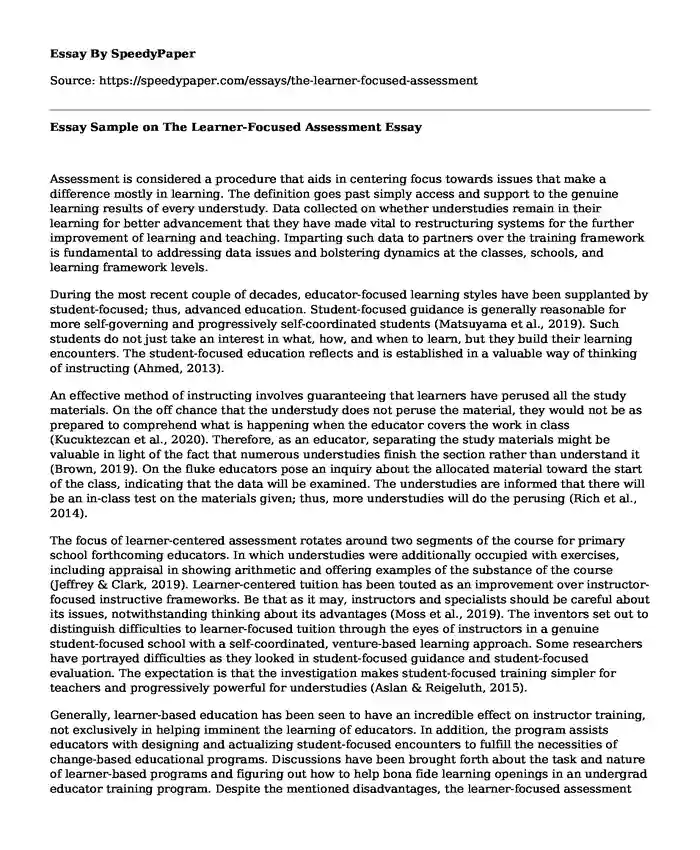Assessment is considered a procedure that aids in centering focus towards issues that make a difference mostly in learning. The definition goes past simply access and support to the genuine learning results of every understudy. Data collected on whether understudies remain in their learning for better advancement that they have made vital to restructuring systems for the further improvement of learning and teaching. Imparting such data to partners over the training framework is fundamental to addressing data issues and bolstering dynamics at the classes, schools, and learning framework levels.
During the most recent couple of decades, educator-focused learning styles have been supplanted by student-focused; thus, advanced education. Student-focused guidance is generally reasonable for more self-governing and progressively self-coordinated students (Matsuyama et al., 2019). Such students do not just take an interest in what, how, and when to learn, but they build their learning encounters. The student-focused education reflects and is established in a valuable way of thinking of instructing (Ahmed, 2013).
An effective method of instructing involves guaranteeing that learners have perused all the study materials. On the off chance that the understudy does not peruse the material, they would not be as prepared to comprehend what is happening when the educator covers the work in class (Kucuktezcan et al., 2020). Therefore, as an educator, separating the study materials might be valuable in light of the fact that numerous understudies finish the section rather than understand it (Brown, 2019). On the fluke educators pose an inquiry about the allocated material toward the start of the class, indicating that the data will be examined. The understudies are informed that there will be an in-class test on the materials given; thus, more understudies will do the perusing (Rich et al., 2014).
The focus of learner-centered assessment rotates around two segments of the course for primary school forthcoming educators. In which understudies were additionally occupied with exercises, including appraisal in showing arithmetic and offering examples of the substance of the course (Jeffrey & Clark, 2019). Learner-centered tuition has been touted as an improvement over instructor-focused instructive frameworks. Be that as it may, instructors and specialists should be careful about its issues, notwithstanding thinking about its advantages (Moss et al., 2019). The inventors set out to distinguish difficulties to learner-focused tuition through the eyes of instructors in a genuine student-focused school with a self-coordinated, venture-based learning approach. Some researchers have portrayed difficulties as they looked in student-focused guidance and student-focused evaluation. The expectation is that the investigation makes student-focused training simpler for teachers and progressively powerful for understudies (Aslan & Reigeluth, 2015).
Generally, learner-based education has been seen to have an incredible effect on instructor training, not exclusively in helping imminent the learning of educators. In addition, the program assists educators with designing and actualizing student-focused encounters to fulfill the necessities of change-based educational programs. Discussions have been brought forth about the task and nature of learner-based programs and figuring out how to help bona fide learning openings in an undergrad educator training program. Despite the mentioned disadvantages, the learner-focused assessment continues to have more positive effects on students. The positive impact is associated with more understanding of the syllabus by students since they come up with their learning program.
References
Ahmed, A. K. (2013). Teacher-centered versus learner-centered teaching style. Journal of Global Business Management, 9(1), 22.
Aslan, S., & Reigeluth, C. M. (2015). Examining the challenges of learner-centered education. Phi delta kappan, 97(4), 63-68.
Brown, S. (2019). Developing Authentic Assessment for English Language Teaching. The International Journal of Language and Cultural (TIJOLAC), 1(01), 12-24.
Jeffrey, D. M., & Clark, R. M. (2019). Supplementing Western perspectives of learner-centered instruction with a Daoist approach towards authentic power sharing in the classroom. International Journal of Contemporary Education, 2(1), 9-16.
Koh, K., & Chapman, O. (2019). Problem-based learning, assessment literacy, mathematics knowledge, and competencies in teacher education. Papers on Postsecondary Learning and Teaching, 3, 74-80.
Kucuktezcan, I. I. K., Altay, S., & Mede, E. (2020). THE EFFECTS OF PEER ASSESSMENT VS. TEACHER ASSESSMENT ON THE WRITING APPREHENSION OF ENGLISH LEARNERS. Contemporary Perspectives on Research in Educational Assessment, 107.
Matsuyama, Y., Nakaya, M., Okazaki, H., Lebowitz, A. J., Leppink, J., & Van Der Vleuten, C. (2019). Does changing from a teacher-centered to a learner-centered context promote self-regulated learning: a qualitative study in a Japanese undergraduate setting. BMC medical education, 19(1), 152.
Moss, Connie M., and Susan M. Brookhart (2019). Advancing formative assessment in every classroom: A guide for instructional leaders. ASCD.
Rich Jr, J. D., Colon, A. N., Mines, D., & Jivers, K. L. (2014). Creating learner-centered assessment strategies for promoting greater student retention and class participation. Frontiers in Psychology, 5, 595.
Cite this page
Essay Sample on The Learner-Focused Assessment. (2023, Apr 19). Retrieved from https://speedypaper.com/essays/the-learner-focused-assessment
Request Removal
If you are the original author of this essay and no longer wish to have it published on the SpeedyPaper website, please click below to request its removal:
- Historical Essay Sample: Effect of the Second Revolution
- Free Essay: Relationship between Leadership Style, Work Balance, Learning and Development, and Employee Engagement
- Free Essay on Police and Their Clients
- Essay Example: Sacrificial Killing in Greek Mythology
- Essay Sample: Reflection Paper on Rugby World Cup 2017
- Essay Example on Tet Offensive
- Essay Example on Science of Play: Play as Intervention, Play in Schools
Popular categories





